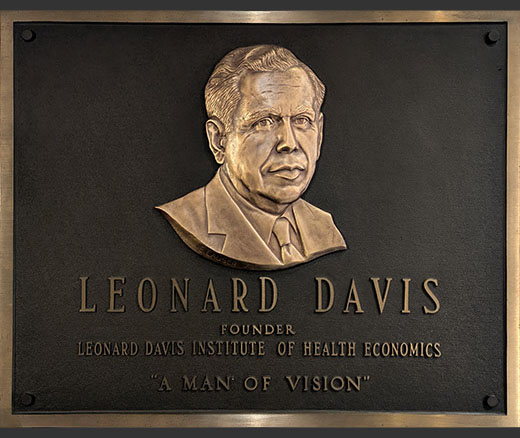
Understanding the Evidence: SNAP and Health
Six Studies That Highlight How Losing SNAP Can Raise Food Insecurity and Affect Health
News

Despite evidence that diversity, equity, and inclusion (DEI) policies and programs improve the quality of health care delivery, a 2023 U.S. Supreme Court (SCOTUS) ruling that struck down race-conscious college admissions has spawned a rapidly widening anti-DEI political movement that is particularly threatening to the health care workforce. That’s according to Florence Momplaisir, MD, MSHP, Assistant Professor of Infectious Diseases (ID) at the University of Pennsylvania Perelman School of Medicine and Director of Implementation Science Core at the Penn Center for AIDS Research (CFAR).

Momplaisir, an LDI Senior Fellow, made the remarks as featured speaker at the May 23 third Annual Memorial Grand Rounds for one of the Perelman School’s most esteemed faculty members, J. Sanford “Sandy” Schwartz, MD. Organized by the Penn Medicine Division of General Internal Medicine (DGIM) the event honors the Professor of Medicine and Health Care Management, and former LDI Executive Director (1989-1998) who died in 2021. He was famed for his mentoring of generations of Penn health services research students, one of whom was Florence Momplaisir.
Momplaisir’s talk was made even more poignant by the fact that she herself came through an academic health-care oriented DEI program and then went on to become the Vice Chair for DEI in the Department of Infectious Diseases at the Perelman School of Medicine.
“I am not a product of Ivy League education, so I felt very much an imposter when I came to Penn,” said the Haiti-born Momplaisir. “Sandy Schwartz created a space for me in places where I didn’t really feel that I belonged.”

Along with his mentorship, Schwartz also introduced her to the Harold Amos Medical Faculty Development Program (AMFDP), a DEI initiative that mentors and supports young medical professionals from underrepresented minorities in career development.
“If Sandy had not introduced me to the AMFDP program I wouldn’t be here today,” said Momplaisir.
Against this context, Momplaisir’s presentation looked back at the 2023 Students for Fair Admissions (SFFA) v. Harvard and SFFA v. University of North Carolina (UNC) SCOTUS ruling and its accelerating impact across the country as a growing number of states pass laws to defund public schools’ DEI offices and officers and remove diversity statements from hiring practices.
“The results of past DEI programming are clearly visible here at Penn as well as across the country. However, we need to address the elephant in the room which is the shifting socio-political climate when it comes to DEI,” said Momplaisir.
“It’s important to acknowledge that sometimes policies are driven by sentiment rather than data,” said Momplaisir. “What this Supreme Court ruling has done is swing the pendulum away from four years ago when the murder of George Floyd set off a national wave of racial awakening as institutions and individuals responded publicly with renewed commitments to DEI. Although the SCOTUS ruling was tailored to undergraduate admissions, it has wide implications beyond undergraduate admissions, including medical training and other aspects of the medical workforce.”
Momplaisir displayed a map showing that nine states have enacted DEI legal bans, 16 other state legislatures have introduced similar anti-DEI bills, and two more states are expected to introduce anti-DEI bills soon.

“The reach of these laws and bills is beyond just undergraduate admission and this is problematic because we know there is currently attrition for underrepresented minorities across all levels of the academic health care spectrum,” said Momplaisir. “So, the concern here is that by limiting opportunities so early, we’re further limiting the reach of underrepresented minorities for achievement in higher education which is the path to so many health care professions. This is particularly worrisome in workforce areas like infectious disease, because workforce diversity positions us in a place of strength to appropriately respond to emerging pandemics and epidemics and in areas like HIV/AIDS prevention and treatment.”
Momplaisir pointed to four areas where DEI plays a pivotal role in academic medicine:
Momplaisir pointed to the 2021 Press Ganey survey on the impact of workforce diversity on employee retention. It queried more than 400,000 health care workers in 118 health systems to compare DEI perceptions against worker intention to leave the organization. It found that twice as many employees intended to leave when DEI was not prioritized in their organization. The risk of an employee leaving within three years was more than four times higher if employees felt that their organization undervalued people from diverse backgrounds.
“In terms of team performance, it’s very important to understand that psychological safety is a key ingredient in effective teamwork,” said Momplaisir. “That’s when there’s an environment of comfort in which team members can share ideas, take risks, and be vulnerable without fear of negative consequences.”
“A lot of this team psychological safety work data was pioneered by Harvard Business School Professor Amy C. Edmondson, PhD, who studies teaming, psychological safety, and organizational learning,” said Momplaisir. “She looked at the relationship of team diversity to team performance. What she found was that even with very diverse teams with low psychological safety levels, team performance was poor. However, when diversity and psychological safety were high, team performance went through the roof, demonstrating that both are needed to create innovative and highly performing teams.”
“This tells us why diversity is important and why we need to encourage diverse environments across academic medicine and open pathways that invite students from underrepresented backgrounds to pursue academic studies in the health care professions,” said Momplaisir.


Six Studies That Highlight How Losing SNAP Can Raise Food Insecurity and Affect Health

Includes $1 Million in Donations to Meet a Matching Challenge

Government Regulatory Power Wanes as Power Accrues to Courts and Corporations

Temporary Shutdown Losses are Only the Beginning: New Rules Under the One Big Beautiful Bill Act will Shrink SNAP Benefits, and Worsen Food Insecurity for Millions Across the U.S.
Research Brief: Shorter Stays in Skilled Nursing Facilities and Less Home Health Didn’t Lead to Worse Outcomes, Pointing to Opportunities for Traditional Medicare

A New Call to Action Urges Three Ways State and Local Leaders Can Act To Ban Additives, Improve Food Labels, and Restrict Marketing to Children